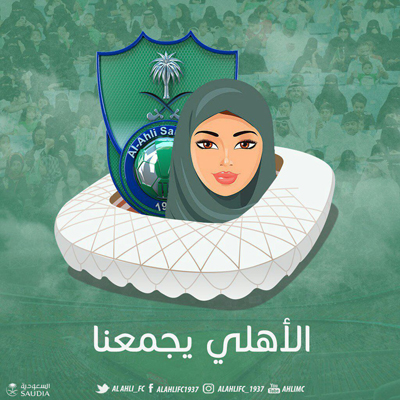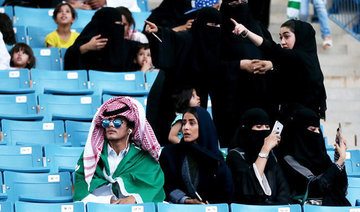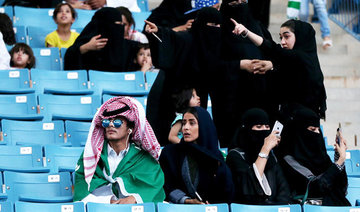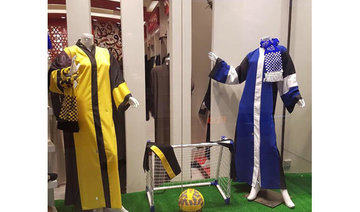JEDDAH: Saudi football clubs are appealing directly to female fans for support through ad campaigns and social media as women are allowed into stadiums for the first time on Friday.
The official Twitter account for Al-Ittihad directed a tweet toward the club’s female fans on Tuesday. It said that women were powerful agents in the success of the team, just like their male counterparts.
Two weeks ago, a campaign was launched for fans to show their support for their favorite teams through SMS texts. Al-Ittihad’s tweet is riding on the hype surrounding women attending the club’s match.
Al-Ittihad’s offical tweet generated a massive response from the team’s lovers and haters alike. Elaaf tweeted: “We’re finally being addressed as a part of Ittihad’s fanclub.”
Many couldn’t believe they were finally being noticed. One Twitter user said: “I never thought I’d live to see such a tweet, we’re all here for you.”
Others such as Twitter user Shikha provided proof of their contribution by posting photos of the sent text, while many women declared they were now switching support to Al-Ittihad for being the first to address them as an audience.
One die-hard fan tweeted: “I will attend the classico match and I’ll even pay for tickets for other girls attending.”
Dedicated Al-Ittihad female fans are preparing to attend the club’s first match of the year against Al-Hilal on Jan. 13, in Riyadh’s King Fahd International Stadium. Al-Ahli fans will be called on to show up for a Jeddah match against the visiting Al-Batin team on Friday in the King Abdullah Sports City stadium.
The General Sports Authority (GSA) revealed the seating plan for the Riyadh match. Inside the stadium, women will occupy the northern area through gates two, three and four, and the southern area through gates 40, 41 and 42. They are are expected to fill 7,500 seats.
Head of the Saudi Federation for Sports Media, Raja Al-Sulami, told Arab News that they have made the stadium ready to receive women. He added: “In cooperation with the Saudi Federation for Community Sports, we have made all necessary arrangements to receive them in an atmosphere that respects their privacy.” He added that there are 14,000 seats at the Jeddah’s “Shining Jewel” stadium ready for the occasion.

A tweet from the official account of Al-Ahli football club
The GSA also announced a new category for VVIPs with a single ticket costing SR10,000 ($2,666) in all Saudi professional league matches, beginning with Friday’s round 17 match between Al-Ahli and Al-Batin. The tweet was met with disbelief from both Al-Ittihad and Al-Hilal fans, who called the price “outrageous.”
Fahad Al-Zahrani, an Al-Ahli club board member and director of the club’s media center, told Arab News that the attendance of the president of the Saudi Federation for Community Sports, Princess Reema bint Bandar bin Sultan, emphasized the importance of the event.
“Through our Twitter page, we have also posted some instructions for entering the stadium. We also gave women that are going to attend the match some information about the stadium facilities, such as bathrooms, praying zones and even medical clinics that they can visit in cases they need to,” Al-Zahrani said.
Many Saudi women celebrities reacted to the news of the weekend matches positively.
Shoura Council member and founder of the Jeddah United basketball team Lina Almaeena told Arab News: “I’m ecstatic! It’s a historical moment in Saudi for women. It’s a huge alternative for them to go to the stadium together and enjoy their time, other than going to malls or dining out. It’ll have an impact on many levels, socially, economically and on a family level.”
Almaeena is thrilled and will attend the other football match that will be held on Friday between Al-Ahli and Al-Batin in Jeddah.
Hadeel Al-Shumrani, the first Saudi Zumba trainer and also an actress, is a big football fan. “For me Al-Ittihad is not just a club it is more than that, as you can see in most of the matches how the spirit of the fans and how they encourage their team,” she told Arab News.
“I would absolutely attend the game with my friends,” she added. “I believe such activities are very useful for women to enrich our sports knowledge and it also grows positive competition spirit, hopefully we will be able to participate in games in the coming years.”
Diehard female national football fans are also looking forward to the big day.
“I never thought I’d ever be able to attend a football match in Saudi! I will be at the soccer match to support my team! Hilal all the way!” 19-year-old Sara Abdul-Aziz said.
The excitement and enthusiasm is contagious. For decades, female fans would have to watch games on TV screens; now they have a chance to see the action live.
Rania bin Yassin, a mother of four, told Arab News: “I’d love to attend with my brothers. They always go the matches together, but this time, I will attend with them! It’s definitely a new experience that I’m looking forward to!”
Women are gearing up with face paint and team shirts to show their support and enthusiasm. Dedicated female soccer fans have previously traveled abroad to watch the matches and cheer their teams on.
Muna AbuSulayman, a Saudi presenter and the first Saudi broadcaster to appear on Arab satellite channels, and co-host of one of MBC’s most popular social programs, Kalam Nawaem, told Arab News: “I actually don’t care about football at all. However, I think it is an overdue decision that will help girls to participate in the ecosystem of sports.”
She added, “I love reading about how the stadiums are working hard to accommodate women from bathrooms to eating areas.”
Lama Al-Sulaiman, who was elected deputy chairwoman of the Jeddah Chamber of Commerce and Industry in December 2009, becoming the first female to hold such a post in Saudi history, told Arab News: “I am not one of the football fans, but I am happy with this event and this good initiative. I also think that the most important thing that will result from the attendance of matches is bonding between family members, providing a modern environment in which the inhabitants of the city meet.”
She added, “The sense of enthusiasm and participation of sports and leisure will reflect on respecting the systems of events and dealing with people, will also increase confidence and good faith in the behavior of our youth.”
Yomn Luqman, a sports journalist who declined to mention which club is her favorite, told Arab News: “As this game will be the first match with women attendees after the historical decision of the sports authority, I believe it will have a huge number of attendees and I received many calls from football fans asking about what to wear and how to enter the stadium.”
She added: “These days the weather is very beautiful in the Kingdom, which will help people to enjoy it more. It is worth mentioning that women now really care to attend the match more than they care for which club they want to win.”
The first opportunity for Saudi female football fans to attend a football match was in 2015 in London during the Saudi Super Cup final. That was the first appearance of Saudi women in a football stadium attending a match between two Saudi clubs.
Nahed Fahad, who attended the match, said: “It was fantastic and exciting. The guys were well behaved and there were no crazy antics, like many portray. I went with my daughter and we had a good time in London, and I look forward to going with her again in Riyadh.”
International matches that feature the Saudi national squad have always had female fans. However, sports, and especially football, have been viewed as a masculine activity.
Playing any kind of sport used to be difficult for women in Saudi Arabia, since public female practice of physical sports was a socially controversial issue. Before the Ministry of Education announced in July 2017 that girls in public schools would receive physical education by the start of the 2017-2018 academic year, girls did not have access to physical education, except in some private schools.
In 2016, the Saudi Cabinet appointed Princess Reema as undersecretary for the women’s section of the General Authority for Sports, becoming the first woman to hold a government sports position in the Kingdom.
— With input from Noor Nugali, Aseel Bashraheel & Ruba Obaid.




































